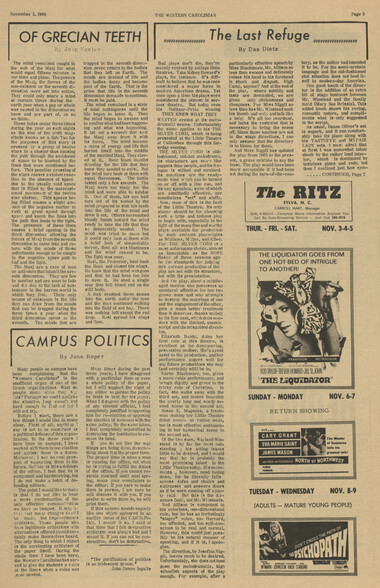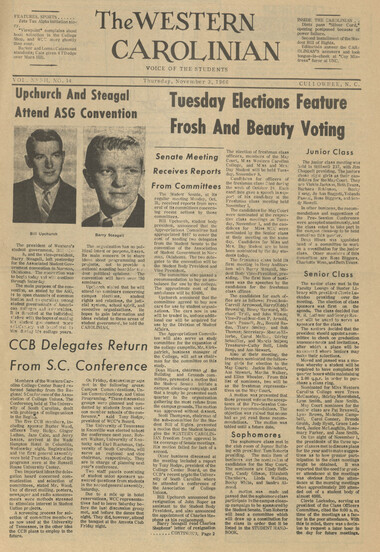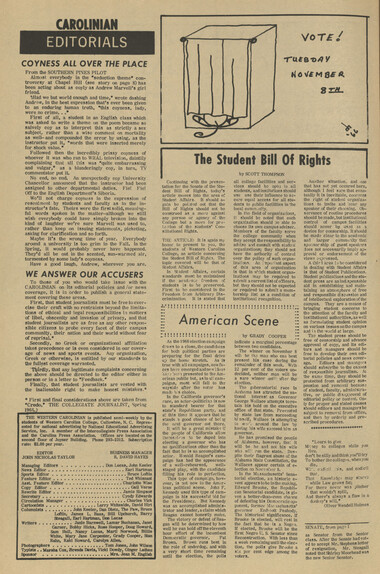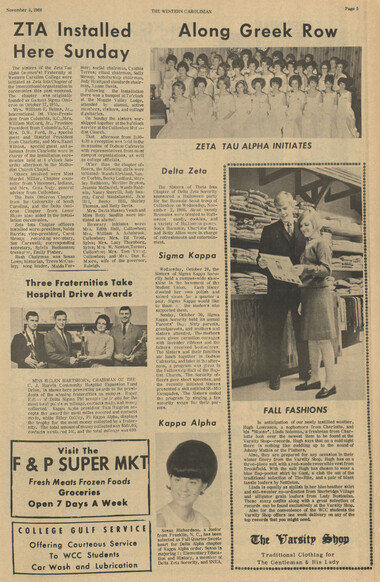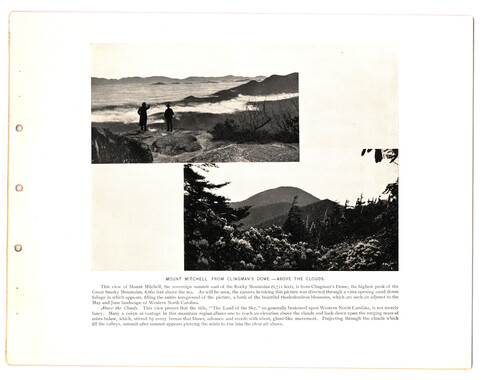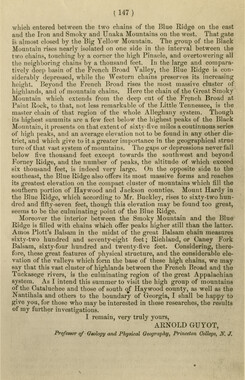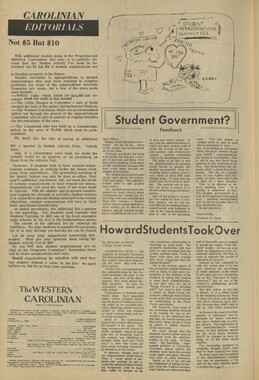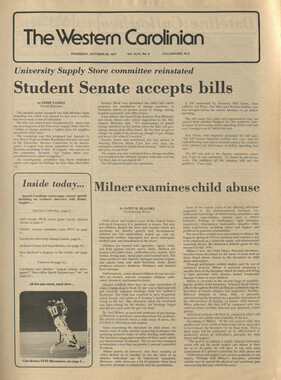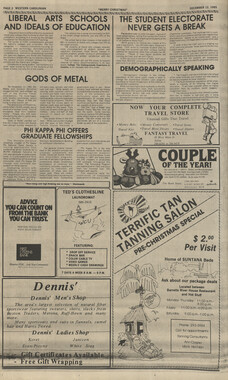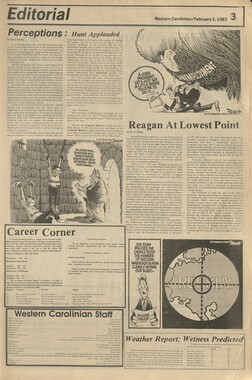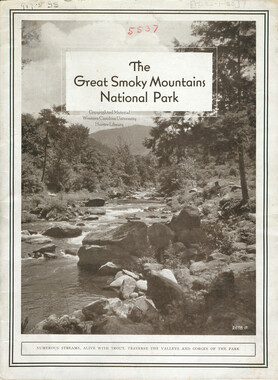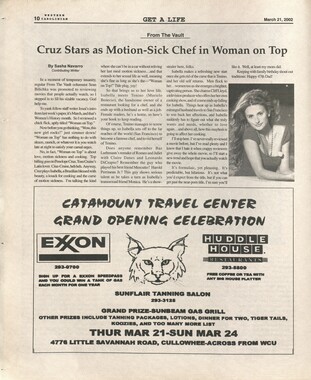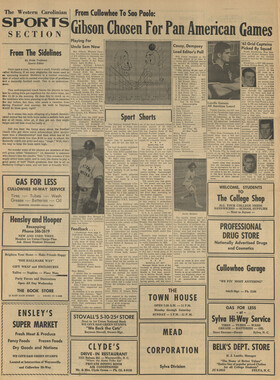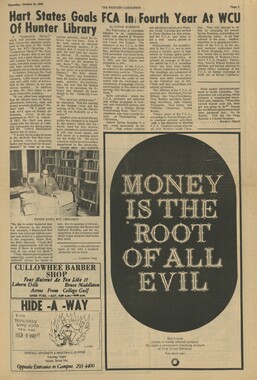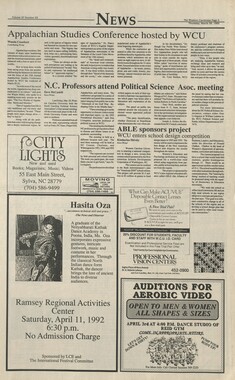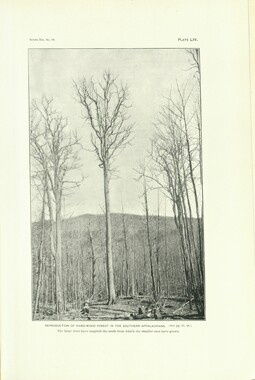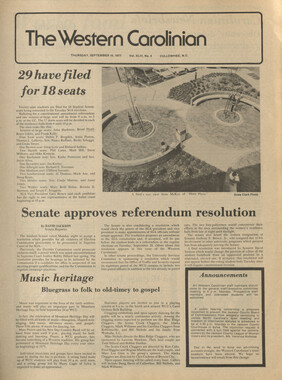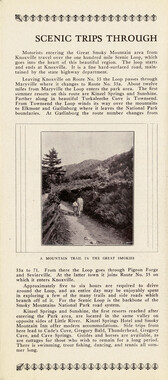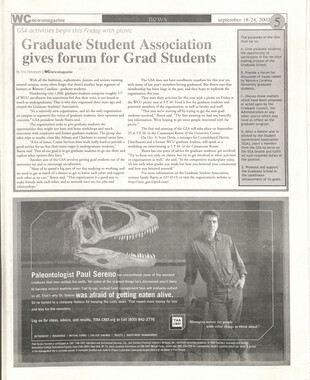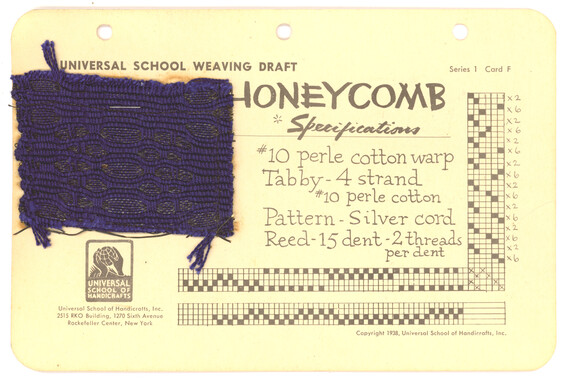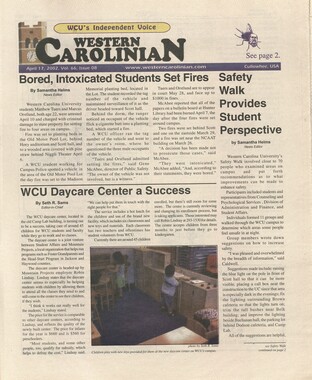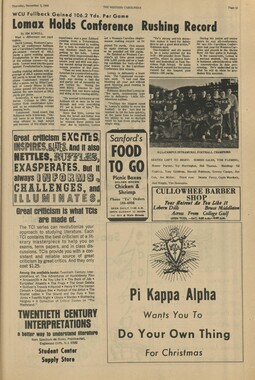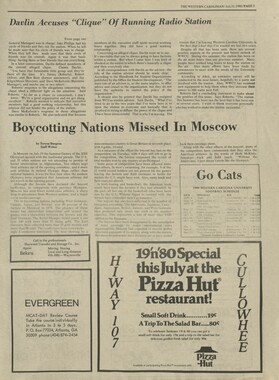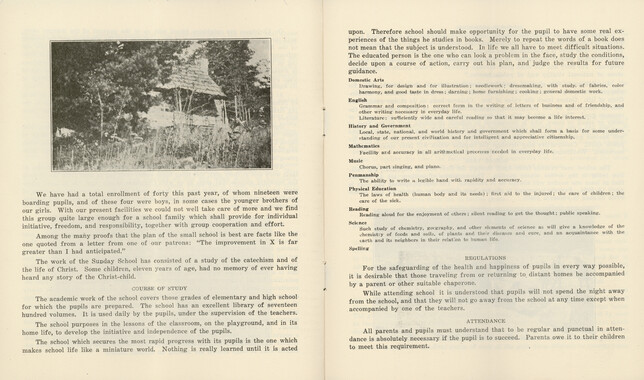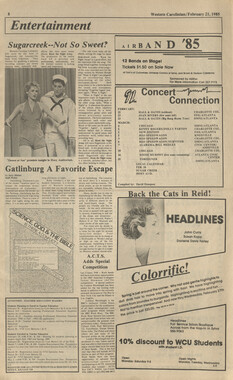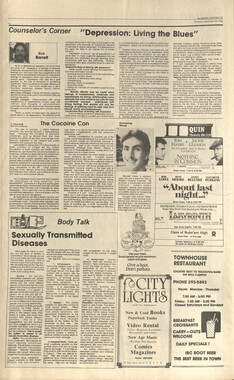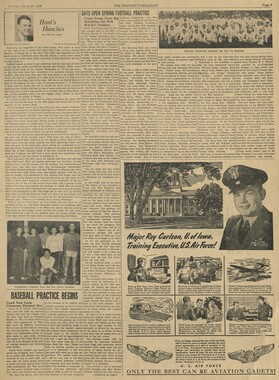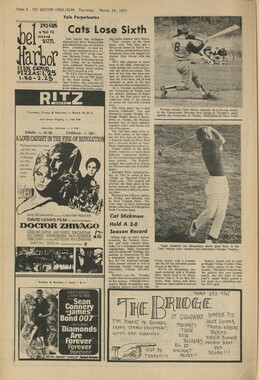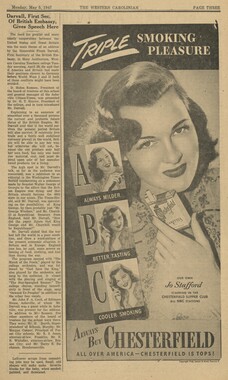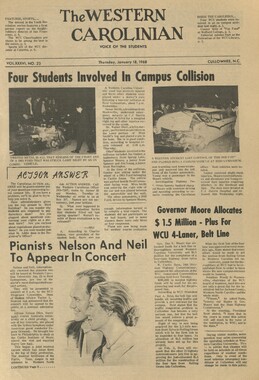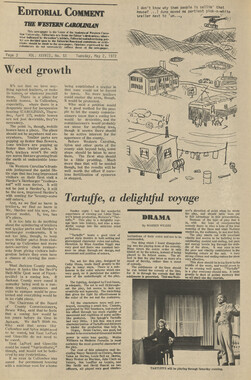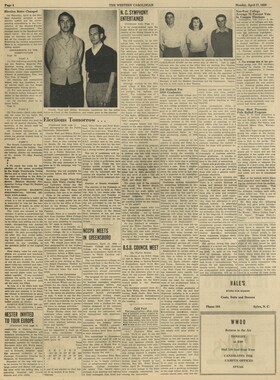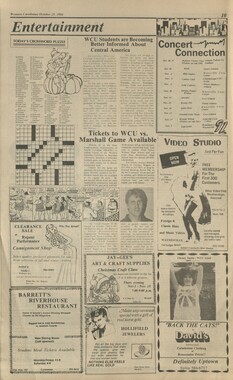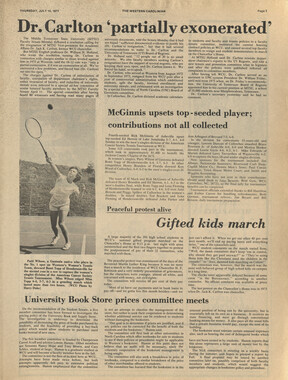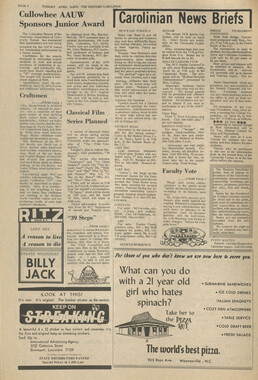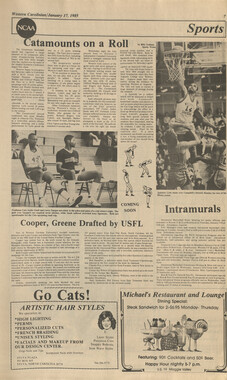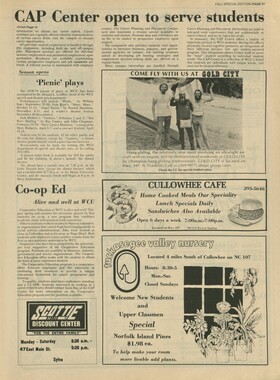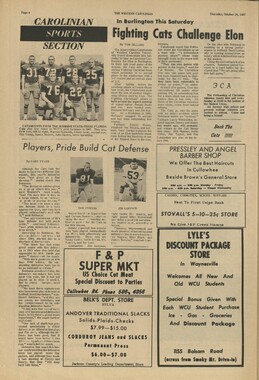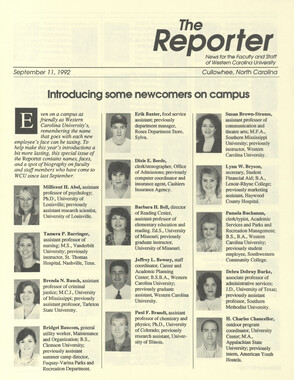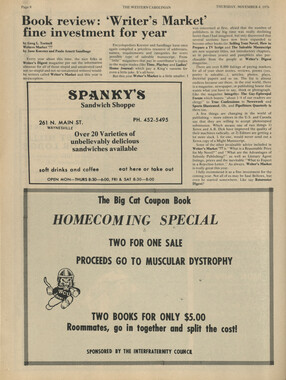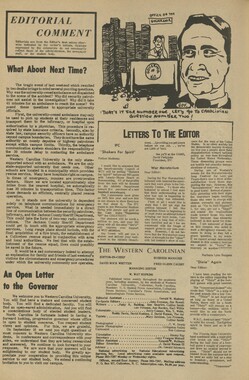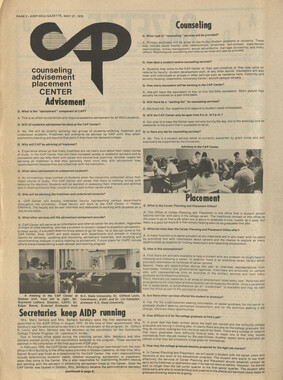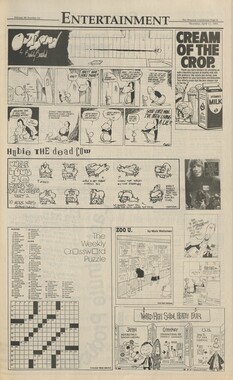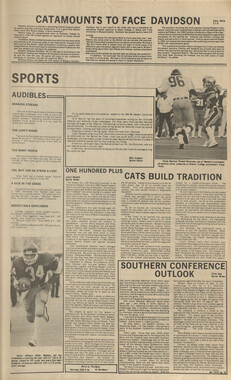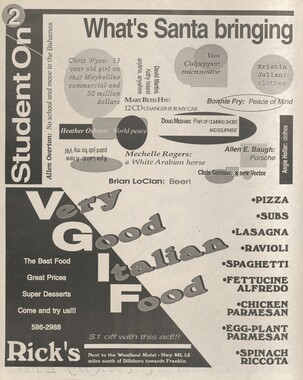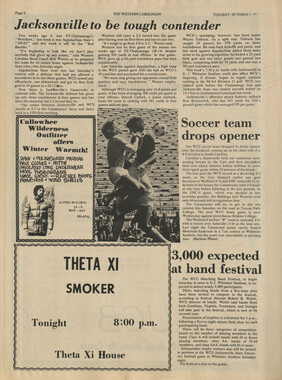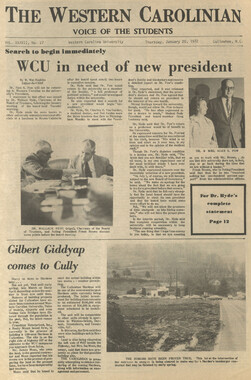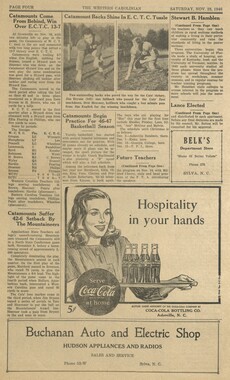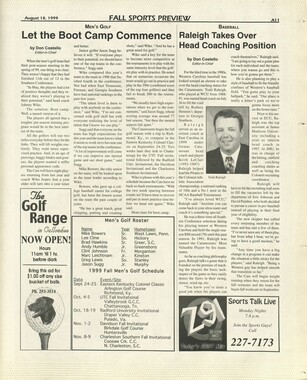Western Carolina University (20)
View all
- Canton Champion Fibre Company (2308)
- Cherokee Traditions (293)
- Civil War in Southern Appalachia (165)
- Craft Revival (1942)
- Great Smoky Mountains - A Park for America (2767)
- Highlights from Western Carolina University (430)
- Horace Kephart (941)
- Journeys Through Jackson (154)
- LGBTQIA+ Archive of Jackson County (26)
- Oral Histories of Western North Carolina (314)
- Picturing Appalachia (6772)
- Stories of Mountain Folk (413)
- Travel Western North Carolina (160)
- Western Carolina University Fine Art Museum Vitreograph Collection (129)
- Western Carolina University Herbarium (92)
- Western Carolina University: Making Memories (708)
- Western Carolina University Publications (2283)
- Western Carolina University Restricted Electronic Theses and Dissertations (146)
- Western North Carolina Regional Maps (71)
- World War II in Southern Appalachia (131)
University of North Carolina Asheville (6)
View all
- Allanstand Cottage Industries (62)
- Appalachian National Park Association (53)
- Bennett, Kelly, 1890-1974 (1388)
- Berry, Walter (76)
- Brasstown Carvers (40)
- Carver, George Washington, 1864?-1943 (26)
- Cathey, Joseph, 1803-1874 (1)
- Champion Fibre Company (233)
- Champion Paper and Fibre Company (297)
- Cherokee Indian Fair Association (16)
- Cherokee Language Program (22)
- Crowe, Amanda (40)
- Edmonston, Thomas Benton, 1842-1907 (7)
- Ensley, A. L. (Abraham Lincoln), 1865-1948 (275)
- Fromer, Irving Rhodes, 1913-1994 (70)
- George Butz (BFS 1907) (46)
- Goodrich, Frances Louisa (120)
- Grant, George Alexander, 1891-1964 (96)
- Heard, Marian Gladys (60)
- Kephart, Calvin, 1883-1969 (15)
- Kephart, Horace, 1862-1931 (313)
- Kephart, Laura, 1862-1954 (39)
- Laney, Gideon Thomas, 1889-1976 (439)
- Masa, George, 1881-1933 (61)
- McElhinney, William Julian, 1896-1953 (44)
- Niggli, Josephina, 1910-1983 (10)
- North Carolina Park Commission (105)
- Osborne, Kezia Stradley (9)
- Owens, Samuel Robert, 1918-1995 (11)
- Penland Weavers and Potters (36)
- Roberts, Vivienne (15)
- Roth, Albert, 1890-1974 (142)
- Schenck, Carl Alwin, 1868-1955 (1)
- Sherrill's Photography Studio (2565)
- Southern Highland Handicraft Guild (127)
- Southern Highlanders, Inc. (71)
- Stalcup, Jesse Bryson (46)
- Stearns, I. K. (213)
- Thompson, James Edward, 1880-1976 (226)
- United States. Indian Arts and Crafts Board (130)
- USFS (683)
- Vance, Zebulon Baird, 1830-1894 (1)
- Weaver, Zebulon, 1872-1948 (58)
- Western Carolina College (230)
- Western Carolina Teachers College (282)
- Western Carolina University (1794)
- Western Carolina University. Mountain Heritage Center (18)
- Whitman, Walt, 1819-1892 (10)
- Wilburn, Hiram Coleman, 1880-1967 (73)
- Williams, Isadora (3)
- Cain, Doreyl Ammons (0)
- Crittenden, Lorraine (0)
- Rhodes, Judy (0)
- Smith, Edward Clark (0)
- Appalachian Region, Southern (2399)
- Asheville (N.C.) (1917)
- Avery County (N.C.) (26)
- Blount County (Tenn.) (161)
- Buncombe County (N.C.) (1671)
- Cherokee County (N.C.) (283)
- Clay County (N.C.) (555)
- Graham County (N.C.) (233)
- Great Smoky Mountains National Park (N.C. and Tenn.) (510)
- Haywood County (N.C.) (3522)
- Henderson County (N.C.) (70)
- Jackson County (N.C.) (4692)
- Knox County (Tenn.) (25)
- Knoxville (Tenn.) (12)
- Lake Santeetlah (N.C.) (10)
- Macon County (N.C.) (420)
- Madison County (N.C.) (211)
- McDowell County (N.C.) (39)
- Mitchell County (N.C.) (132)
- Polk County (N.C.) (35)
- Qualla Boundary (981)
- Rutherford County (N.C.) (76)
- Swain County (N.C.) (2113)
- Transylvania County (N.C.) (247)
- Watauga County (N.C.) (12)
- Waynesville (N.C.) (73)
- Yancey County (N.C.) (72)
- Aerial Photographs (3)
- Aerial Views (60)
- Albums (books) (4)
- Articles (1)
- Artifacts (object Genre) (228)
- Bibliographies (1)
- Biography (general Genre) (2)
- Cards (information Artifacts) (38)
- Clippings (information Artifacts) (191)
- Crafts (art Genres) (622)
- Depictions (visual Works) (21)
- Design Drawings (1)
- Drawings (visual Works) (184)
- Envelopes (73)
- Facsimiles (reproductions) (1)
- Fiction (general Genre) (4)
- Financial Records (12)
- Fliers (printed Matter) (67)
- Glass Plate Negatives (381)
- Guidebooks (2)
- Internegatives (10)
- Interviews (812)
- Land Surveys (102)
- Letters (correspondence) (1013)
- Manuscripts (documents) (619)
- Maps (documents) (177)
- Memorandums (25)
- Minutes (administrative Records) (59)
- Negatives (photographs) (5835)
- Newsletters (1285)
- Newspapers (2)
- Occupation Currency (1)
- Paintings (visual Works) (1)
- Pen And Ink Drawings (1)
- Periodicals (193)
- Personal Narratives (10)
- Photographs (12976)
- Plans (maps) (1)
- Poetry (7)
- Portraits (1960)
- Postcards (329)
- Programs (documents) (151)
- Publications (documents) (2237)
- Questionnaires (65)
- Scrapbooks (282)
- Sheet Music (2)
- Slides (photographs) (402)
- Songs (musical Compositions) (2)
- Sound Recordings (796)
- Specimens (92)
- Speeches (documents) (15)
- Tintypes (photographs) (8)
- Transcripts (322)
- Video Recordings (physical Artifacts) (23)
- Vitreographs (129)
- Text Messages (0)
- A.L. Ensley Collection (275)
- Appalachian Industrial School Records (7)
- Appalachian National Park Association Records (336)
- Axley-Meroney Collection (2)
- Bayard Wootten Photograph Collection (20)
- Bethel Rural Community Organization Collection (7)
- Blumer Collection (5)
- C.W. Slagle Collection (20)
- Canton Area Historical Museum (2110)
- Carlos C. Campbell Collection (282)
- Cataloochee History Project (65)
- Cherokee Studies Collection (4)
- Daisy Dame Photograph Album (5)
- Daniel Boone VI Collection (1)
- Doris Ulmann Photograph Collection (112)
- Elizabeth H. Lasley Collection (1)
- Elizabeth Woolworth Szold Fleharty Collection (4)
- Frank Fry Collection (95)
- George Masa Collection (173)
- Gideon Laney Collection (452)
- Hazel Scarborough Collection (2)
- Hiram C. Wilburn Papers (28)
- Historic Photographs Collection (236)
- Horace Kephart Collection (861)
- Humbard Collection (33)
- Hunter and Weaver Families Collection (1)
- I. D. Blumenthal Collection (4)
- Isadora Williams Collection (4)
- Jesse Bryson Stalcup Collection (47)
- Jim Thompson Collection (224)
- John B. Battle Collection (7)
- John C. Campbell Folk School Records (80)
- John Parris Collection (6)
- Judaculla Rock project (2)
- Kelly Bennett Collection (1407)
- Love Family Papers (11)
- Major Wiley Parris Civil War Letters (3)
- Map Collection (12)
- McFee-Misemer Civil War Letters (34)
- Mountain Heritage Center Collection (4)
- Norburn - Robertson - Thomson Families Collection (44)
- Pauline Hood Collection (7)
- Pre-Guild Collection (2)
- Qualla Arts and Crafts Mutual Collection (12)
- R.A. Romanes Collection (681)
- Rosser H. Taylor Collection (1)
- Samuel Robert Owens Collection (94)
- Sara Madison Collection (144)
- Sherrill Studio Photo Collection (2558)
- Smoky Mountains Hiking Club Collection (616)
- Stories of Mountain Folk - Radio Programs (374)
- The Reporter, Western Carolina University (510)
- Venoy and Elizabeth Reed Collection (16)
- WCU Gender and Sexuality Oral History Project (32)
- WCU Mountain Heritage Center Oral Histories (25)
- WCU Oral History Collection - Mountain People, Mountain Lives (71)
- WCU Students Newspapers Collection (1744)
- Western North Carolina Tomorrow Black Oral History Project (69)
- William Williams Stringfield Collection (2)
- Zebulon Weaver Collection (109)
- African Americans (390)
- Appalachian Trail (35)
- Artisans (521)
- Cherokee art (84)
- Cherokee artists -- North Carolina (10)
- Cherokee language (21)
- Cherokee pottery (101)
- Cherokee women (208)
- Church buildings (167)
- Civilian Conservation Corps (U.S.) (110)
- College student newspapers and periodicals (1830)
- Dams (103)
- Dance (1023)
- Education (222)
- Floods (61)
- Folk music (1015)
- Forced removal, 1813-1903 (2)
- Forest conservation (220)
- Forests and forestry (1058)
- Gender nonconformity (4)
- Great Smoky Mountains National Park (N.C. and Tenn.) (181)
- Hunting (38)
- Landscape photography (10)
- Logging (103)
- Maps (84)
- Mines and mineral resources (8)
- North Carolina -- Maps (18)
- Paper industry (38)
- Postcards (255)
- Pottery (135)
- Railroad trains (71)
- Rural electrification -- North Carolina, Western (3)
- School integration -- Southern States (2)
- Segregation -- North Carolina, Western (5)
- Slavery (5)
- Sports (452)
- Storytelling (245)
- Waterfalls -- Great Smoky Mountains (N.C. and Tenn.) (66)
- Weaving -- Appalachian Region, Southern (280)
- Wood-carving -- Appalachian Region, Southern (328)
- World War, 1939-1945 (173)
Western Carolinian Volume 32 Number 14
Item
Item’s are ‘child’ level descriptions to ‘parent’ objects, (e.g. one page of a whole book).
-
-
November 3, 1966 T4E WCSTEKN CAROLINIAN Page 3 OF GRECIAN TEETH 1 o in Keele r The mind remained caught in the web of the Maxj for what would equal fifteen minutes in our time and plane. The powers of the May, the forces of the non-existent or the seventh dimension were set into action. They could only snare a mind at certain times during the earth year when a gap or whole was caused in the dimension we know and are part of, or so we think. These holes occur three times during the year on such nights as the star of the ninth magnitude known as a Sub Tau for the purposes of this story is crossed ny a group of twelve stars in a cluster thus causing the path through the avoidance of space to be blocked by the lines that were mentioned before. This peculiar crossing of the stars causes a violent reaction in the absencs of space due to the usually void space that is filled by the unaccustomed movement of the twelve star cluster. This spaces being filled causes a slight amount of the negative matter to rush at great speed through space and knock the lines into the path that leads to the light The presence of these lines causes a brief opening in the third dimension allowing the forces of Mqfj from the seventh dimension to come into and return with the minds of those unfortunate enough to be caught, in the negative space path to Gaf and the light. The Maxj are a race of men or anti-men that inhabit the seventh dimension. They are few in number and are soon to fade and di e due to the lack of sustenance in the barren world in which they live. Their only means of existence is the life they can draw from the minds that can be trapped during the three times a year when the third dimension opens :o the seventh. The minds that are trapped in the seventh dimension never return to the bodies that they left on Earth. The minds are drained of life and the bodies decay and become part of the Earth. That is the price that life in the seventh dimension demands to continue. It must be paid. The mind remained in a state of total nothingness until the life began to leave it Then the mind began to awaken and to realize what had been happening and what was happening. It let out a screech that sent the Maxj away from it with its force. The mind became a mass of energy and life that hurled itself into the middle of the startled Maxj. Theyclav- ed at it, their black mouths drooling for the life that they knew they needed to exisc. But the mind tore back at them with equal fierceness. The battle lasted only a few seconds. The Maxj were too many for the mind and were able to subdae it. One of them, his eye half torn out of its socket by the mind prepared to sink his teeth into the life of the mind and draw It out. Others too reached bloody hands toward the mind ready to take the life that they so desperately needed. The mind was tried to nuve but it could only look at them with a brief look of unspeakable terror, then all was blackness and the mind ceased to be. The fight was over. Rosl, the Protector, beat back the lines and closed his wings. He knew that the mind was gone and that he had been too late to save it. He shed a single tear that fell blood red on the still body. A foot crushed three stones into the earth under the tree and the man continued walking into the field of wet hay. There was nothing left except the red drop. Rosl spread his wings and ilew. CAMPUS POLITICS By John Hoper Many people on campus have been complaining that the "Western Carolinian" is the unofficial organ of one of the Greek organizations. What do people mean nhaii they s..; !:Ms?Perhaps we could analyze the situation long enough and hard enough to find o it Hal I will not try. Before I start, there are a few things I would like to make clear. First of all, aiv/hiig I say is not to be conslrued as a political defense of this organization. In the three years I have been on campus, I have worked ivith them in one election and ;igains. them in a dozen. Moreover. I see no real prospect of supporting them in the future. NeiMer is thisadefense of the editor. I feel that he is competent and hardworking, but I do not make a habit of defending editors. The point I would like to make is that I do not like to hear a mass condemnation of the only effective commun' nation we have on campus, It may be t- u i iat many changes -s-i 1Hi be made, but Improvements criticism. Those people who ha/e legitimate criticisms with alternatives offered should certainly make themselves heard. The only thing to which I object is the unrelenting criticism of the paper itself. During the whole time I have been here, the Western Carolinian has served to give the students a voice at the times when a voice was mast needed. M^i.iy times dnring 'die past three years, I have disagreed with a particular item or even a whole policy of the paper, but I will support the right of any editor to pursue the policy he feels is best for his paper. When I disagree with the policy of any elected official, I feel completely justified in opposing him for re-election or opposing the election of someone with the same policy. By the same token. I feel completely unjustified in destroying the institution to remove its head. If you do not like the way things are being done, do something about it at the proper time. The proper time is when a man is running for office, not when he is trying to fulfill the duties of the office. If you cannot restrain yourself until next spring, make your complaints to the editor. If you care to make them in person, I am sure he will discuss it with you. If you prefer to write them in, he will print them. If this column sounds vaguely like one which appeared in an earlier issue of the CAROLINIAN, I meant it so. I said at that time that I felt destructive criticism was always bad and I meant it. If you can not be constructive, don't be destructive. "The purification of politics is an iridescent dream." John James Ingalls M UuMMMMMMMMMMMMM M M w ft ft it If WW WW WW WW WW if WW The Last Refuge MMMMMMMMMMMMMMM MM MM WWWW W WWWWWWW~WWW WW WW Bad plays don't die, they're merely revived by college little theatres. Take Sidney Howard's plays, for instance. It's difficult to believe that he was once consilered a major force In modern American drama. Yet once upon a time his plays were considered the utmost in serious theatre. But today even his Pulitzer-Prize winning THEY KNEW WHAT THEY WANTED creaks at its melodramatic seams. Unfortunately the same applies to his THE SILVER CORD, which is being presented at the Little Theatre at Cullowhee through this Saturday evening. THE SILVEIt CORD is old- fashioned, old-hat melodrama, its characters are more like puppets than people, and its dialogue is stilted and strained Its emotions are the ready- made kind which can be turned on or off with a line cue, and its key speeches, some of which are admittedly effective, are nonetheless "set" and stuffy. Now, none of this is the fault of the Little Theatre. Its only shame should be for choosing such a trite and tedious play to begin with, especially in the light of the many fine and worthy plays available for production by such eminent playwrights as Williams, M'ller, and Albee. For THE SILVER CORD is a must unfortunate choice, almost as lamentable as the ROPE fiasco of three seasons ago So the standards for judging this current prodnction of the play are not with its structure, but with its presentation. Ard the play, about a middle- aged matron who possesses an unnatural affection for her two grown sons and who attempts to destroy the marriage of one and the engagement of the other, gets a much better treatment than it deserves, thanks mainly to its fine cast, wh.i:h does wonders with the limited, anemic script and the misguided direction. Elizabeth Bandy, doing her first role at this theatre, is excellent as the domineering, possessive mother. She's a real asset to the production, and her performance augers well for any future productions she may (and certainly will) be in. Karen Blackmore, too, gives a memorable performance, and brings dignity and grace to the tricky role of Christine. In fact, she walks away with the third act, and makes bearable the overly long and wordy second scene in the second act. Susan E. Magness, a freshman making her Little Theatre debut eomos on rather weak, but is most effective and touching in her hysterical scene in the second act Of the two sons, Wayland winstead is by far the most outstanding ; his acting leaves little to be desired, and I would say that he is probably the most promising talent in the Little Theatre today. His movements , however, need toning down, for he literally falls across sofas and chairs and staircases and answers doors as if he were running off a pan- ty raid. But this is the d r- ectors fault, not Mr. Wiisteads. Ned Allison is competent in his colorless, one-dimensional role, but he has an irritatingly "stagey" voice, too Harvard, too affected, and too self-conscious to be real and normal. However, this could just possibly be his natural manner of speaking, and if it is, I apologize. The direction, by JosefinaNig- gli, leaves much to be desired. Unfortunately, she does not tone down the melodramatic, high schoolish aspects of the play enough. For example, after a By Dan Dietz particularly effective speech by Miss Blackmore, Mr. Allison no less than swoons and delicately raises his hand to his forehead in shock and disgust. High Camp, anyone? And attheendof the play, where subtilty and taste are demanded, we are given only obviousness and cheapness. For Miss Niggli no less than has Mr. Winstead suck his thumb and w-il.t and talk like a baby. It's all too overdone, and lacks the restraint that is necessary to bring the scene off. Since these touches are not in the stage directions, I can only assume that the directory is to blame for them. And Miss Niggli has updated the play from 1905 to the present, a grave mistake to say the least. The play would have been more acceptable if it had been set during the turn-of-the-cen- tury, as the author had intended it to be. For the semi-archaic language and the old-fashioned plot situation does not lend itself to modern-day America. One good touch of the director is the addition of an extra bit of stage business between Mr. Winstead and the family maid (Mary Sue Brissie). This added touch shows his roving, romantic nature, and compliments what is only suggested in the script As usual, Duane Oliver's set is superb, and it can comfortably take its place along with his TARTUFFE and MYFAIR LADY sets. I must .admit that at first I was somewhat taken aback by the rather loud interior, which is dominated by tasteless pinks and reds, but then I realized just how sym- CONTINUED, Page 7 The RITZ SYLVA, N. C. CARROLL HART, Manager DIAL-A MOVIE-Complete Movie Information Anytime You Call By Auto-Answering Service — Just Dial 586-2816 THUR. - FRI. - SAT. NOV. 3-4-5 THE LIQUIDATOR GOES FROM ONE HOT BED OF INTRIGUE TO ANOTHER! ■ ROD TAYLOR-TREVOR HOWARD-JILL SI JOHN THE LIQUIDATOR SUNDAY - MONDAY NOV. 6-7 RETURN SHOWING CARY GRANT EVA MARIE SAINT Thm Mattw of 5usp«n*« t»H» MM tr—twt (•'•' JAMES MASON ALfxeo hitchcocxs NORTH W HORTHMTfsr m4m TUESDAY - WEDNESDAY NOV. 8-9 (ADULTS - MATURE YOUNG PEOPLE)
Object
Object’s are ‘parent’ level descriptions to ‘children’ items, (e.g. a book with pages).
-
The Western Carolinian is Western Carolina University’s student-run newspaper. The paper was published as the Cullowhee Yodel from 1924 to 1931 before changing its name to The Western Carolinian in 1933.
-
